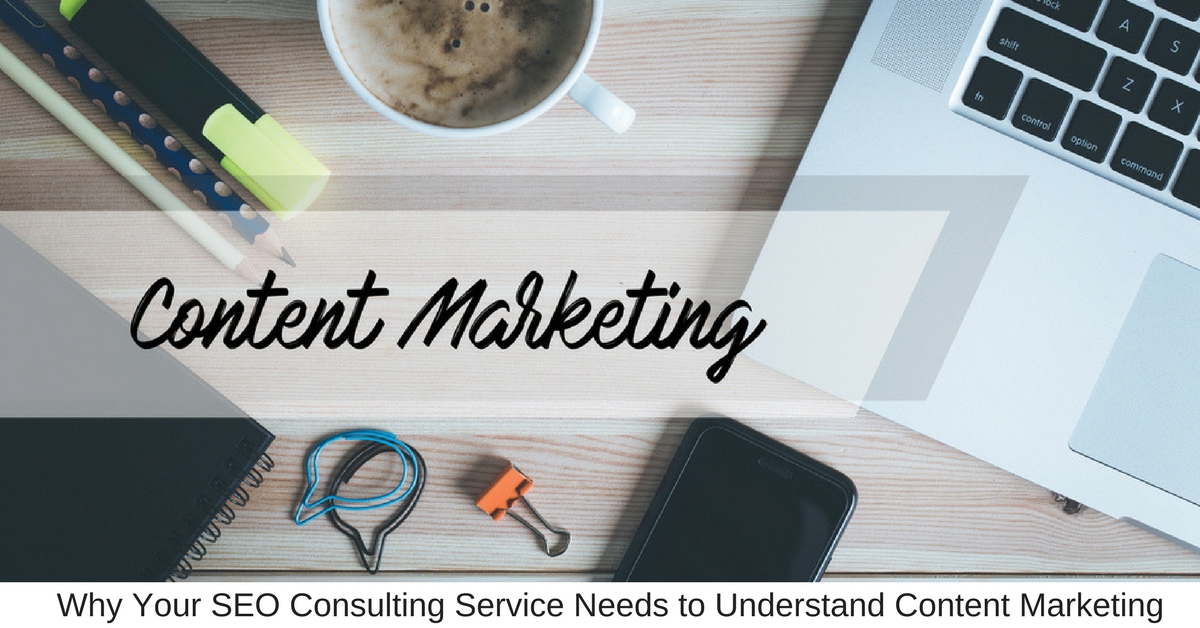So many companies look at search engine optimization as a stand-alone part of their marketing plan, and plan to hire a SEO consulting service to increase their rankings on the search engine results pages. They leave their content marketing to a separate firm or even write it themselves, trusting the SEO consulting service to use that content to propel them to the top.
The belief that content marketing and SEO are two completely components is one of the main reasons many companies aren’t seeing the growth and response they would hope for from either activity.
- Content marketing makes and supports SEO.
- SEO makes and supports content marketing.
Last week, we talked about the cyclical relationship between search engine optimization and branding. Each one amplifies the work of the other.
The relationship with content marketing and SEO is much closer — to the point where you, or your SEO consulting service, can’t really succeed at one without putting effort into the other.
How Did We Get to this Point?
In the past, both fields were rather separate.
Content marketers worked on improving their wordsmithing. They honed in on their target audience, they found relevant topics, they churned out blog posts, white papers, social media posts, and e-books, and learned how to add value to the lives of their readers.
Sure, there was talk of search engine optimization; that helped lead people to the idea of stuffing their content with keywords to improve their site’s search engine ranking. They started using anchor text links, or linking the specific keyword for the piece to the desired Web site.
Some even purchased links to gain exposure.
At the same time, SEO consulting services were highly focused on technical search engine optimization. It often included the black hat techniques listed above, but also found workarounds and shortcuts that are now considered spam.
Technical SEO today is still an important part of a strategic SEO plan. It’s important to understand the non-content component of search engine optimization. This can include everything from boosting the user experience through site speed, mobile optimization, and proper page codes to link-building, site architecture, and the inclusion of a sitemap. In other words, everything that the search spiders and bots will see behind-the-scenes to decide on your ranking.
Businesses often turned to technical SEO to increase their search engine rankings, but as Lee Odden wrote for Content Marketing Institute: “SEO is the condiment, not the sandwich.”
He noted that the surge of social networks, when combined with Google’s very obvious preference for quality content, has shifted the way businesses should look at SEO.
“If a customer-focused content marketing program is the sandwich, then SEO is the mayonnaise,” he said. “It touches nearly everything and enhances the overall flavor of the sandwich, but on its own, it’s not very appetizing.”
While I think the relationship is a bit closer, his point is very true. Neither of these can live in a vacuum, but overall, content marketing deserves more attention when you want to improve your SEO.
The Problem With the Relationship
Over the past few years, the relationship has been improving. Content marketing and SEO have reconciled and now walk hand-in-hand to boost your brand.
Panda, Penguin, and other recent Google updates have placed an emphasis on the quality of content over the quantity of the content being produced, with sites that offer value to their users favored over sites that still use old or black hat tricks to get ranked. Many in the industry have noted this, with more and more professionals writing about and encouraging the fit between the two fields of thought.
Unfortunately, most people outside of the industry only remember the tumultuous past between SEO and content marketing — and in many areas, that relationship still isn’t viewed as being fully integrated. Quite a few in the field believe that one of the top trends in 2017 will be integration between SEO and content marketing teams.
That means that even now, as people have begun to recognize the important connection between the two, they are still viewed and treated as separate, disconnected entities.
They are separate. Content marketing and SEO aren’t the same thing. Content marketing is the broad term for a variety of actions that take your words and images and organize them in a way that attract, engages, and converts content consumers.
SEO is a narrow, technical aspect tool to get that content seen by the people who, theoretically, want to read what’s been published by the brand optimizing a site.
They are not, however, disconnected — or, at least, they shouldn’t be.
Think about what integration might look like. When you meld the two, the SEO specialist can advise and guide content creators on the best way to write and structure their pieces to meet search engine bots’ requirements. Neither side will end up with hurt feelings when content is re-written to meet SEO demands, since it will be created appropriately from the get-go.
At the same time, content creators can share the goals they are hoping to reach that will lead to increased visibility and overall growth. The SEO specialists can dedicate time toward researching the best measures and steps that will get the content to a place where the target audience will see the piece.
SEO Can’t Function Without Content
Google has clearly spoken: content rules.
“They key to creating a great website is to create the best possible experience for your audience with original and high quality content,” the search engine writes.
Google even spells out what you should do to ensure your Web site and content work together:
- Make the site and content useful and informative
- Make your site and content more valuable and useful than others — including your competitor’s
- Make your site and content credible
- Make your site and content engaging
- Make your site and content unique, specific, and of the highest-quality
Google first made steps to promote the need for quality content in early 2011, with the release of the Panda update. They began to see and rank content from the perspective of a human; a wise choice, since humans are the ones reading the content and searching for the Web pages.
When Google did that, they make a strong statement that the old tricks, techniques, and bypasses would no longer work. Content needed to be original, readable, and valuable.
Should a site be audited by humans serving as search quality evaluators, they will be judged based on the 160-page general guideline manual. Among the many criteria categories, these evaluators are taught to remember that Web sites and their pages should help users, with a clear purpose for each page that will provide a benefit to a person’s money or life.
They also show evaluators how to discover and rate the page’s main content, and the quality and amount of content are among some of the most important factors the evaluators will use when they assign one of nine ratings, from lowest to highest.
Others include:
- The E-A-T- of the page: its expertise, authoritativeness,and trustworthiness
- Clear information on who created the content and who is responsible for the Web site
- The reputation of the Web site
It’s clear that Google places a high priority on more than just the words and images appearing on your Web site. They want user-friendly, beneficial content that makes an impact on the users.
Think about it.
If users come to your site and appreciate the content, they’re more likely to return to your site for new, fresh content, which shows bots that the content is interesting. They’re more likely to spend more time on your page, which shows the bots that your site and content is engaging and provides users with a good experience. They’re more likely to to share your content, which shows bots that the content is valuable and worth sharing.
When all of this happens, Google is more likely to see that you are a legitimate Web site that is appreciated and valued in the eyes of your users and Google’s searchers. You’ll start to see your rankings increase at the same time you see a boost in the number of site visitors.
The increase in visitors and higher rankings means more people will come to your site, demanding new and quality content, which leads to the next point.
Content Won’t be Seen Without SEO
One of the biggest keywords in search engine optimization is the keywords themselves. These words and phrases are what a user is likely to type in the search box to find corresponding content.
Finding the keywords is more than just boiling down your product offerings to a few words. It involves research that will give you terms that fit seamlessly into the content you’re creating.
“The importance of good keyword research cannot be overemphasized,” Gabe Arnold notes in a piece pointing out some of the best blogging tools that will help you grow and reach your target audience members.
Research allows you to discover the most popular terms, which you can then search to find the best fit for your Web site.
Once you have those keywords, you can’t just put them on a page and call it a day. These words need to be applied in a practical, beneficial way that will help and improve the lives of users.
Enter content.
Your content is more than just a tool to affect the lives of your readers. When done correctly and optimized for search engines, you’ll see that your content becomes a vehicle for getting your pages boosted in the results pages.
Optimizing content is about more than keywords, though.
- Links are a key component in a good SEO strategy, but sites won’t link to spammy pages. Create good content, though, and you’ll see more reputable sites linking to yours and more of their readers and visitors spending time on your page — and you’ll see your search engine ranking increase.
- A good user experience doesn’t come from a boring block of text. Content should be readable and engaging. Subheads, bullet points, and site maps are technical SEO tools that require content for implementation. Once they’ve been published, though, the bots can look at them and will see that you truly care about your users and want to give them the best experience possible.
- Search engine results are increased as content increases. This isn’t a case of quantity over quality — quality still rules. However, Google prefers new and fresh content — and so do your users. Stop publishing new content and you’ll stop seeing a stream of new and unique visitors.
In other words, if you want people to see your content, you need to put some effort into making sure the content has been optimized for search engines. Otherwise, you won’t get any closer to your sales and marketing goals.
Put the two together, though, and you could see marketing magic happen.
SEO Consulting Services and Content Marketing
As you can see, SEO and content marketing are inextricably linked. You can’t have one without the other — which is why you can’t have an SEO consulting service that doesn’t understand content marketing.
A stand-alone SEO service will know the technical SEO and can give you guidance about your content, but wouldn’t it be better if they also knew how to write SEO-optimized content that gets results? A firm that does both can write the content and focus on the SEO title, the meta description, and work in links that add authority and credibility to your content.
Not sure how your content measures up? Before you call an SEO consulting service that doesn’t understand content creation, contact us. In our free SEO analysis, we can look at your content to see how it’s influencing your search engine results.
I’d love to hear how you’re working to integrate SEO and content marketing in your efforts. Share your successes and struggles in the comments below!
Oops! We could not locate your form.









